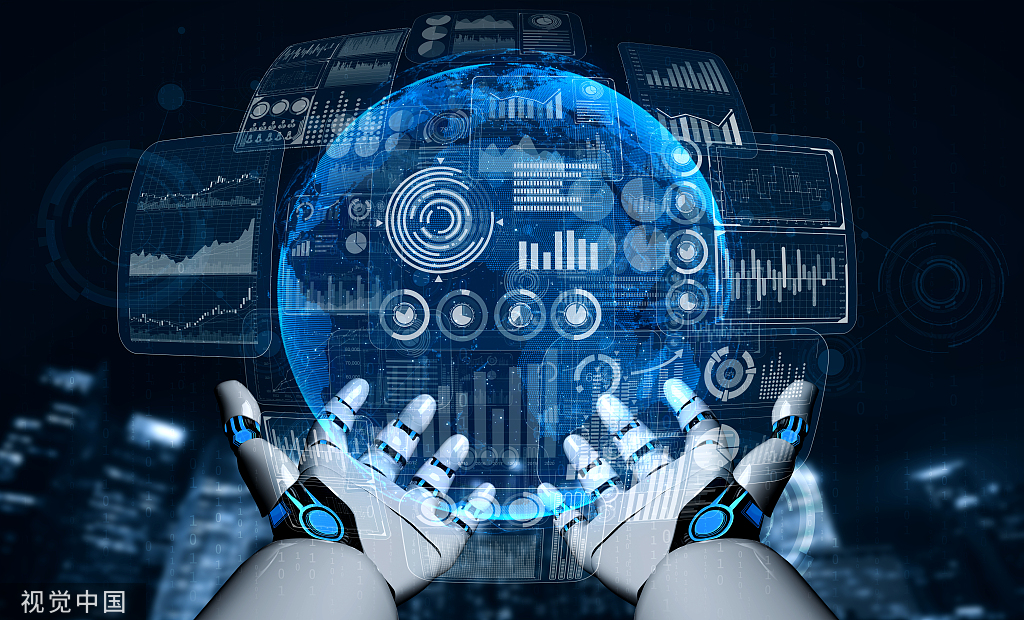
The digital economy — which includes cutting-edge technologies such as big data, artificial intelligence and 5G — has played an increasingly important role in promoting China's high-quality economic growth and industrial upgrade, officials and experts said.
They made the remarks at the Academic Conference on Digital Economy Development and Governance held in Beijing on Tuesday.
Jin Wei, Beijing's vice-mayor, said there is global consensus on facilitating the development of digital economy, with artificial intelligence becoming a focal point, and that China's capital is aiming to be an international science and technology innovation center and a forerunner in the digital economy domain.
Jin said the city has made great strides in 6G, quantum technology and blockchain, and will step up efforts to build digital infrastructure and digital industrial clusters, improve digital governance systems and advance the innovation of forward-looking theories and technologies.
Beijing is striving to be a source of technological innovation in cutting-edge science and emerging industries, and a location for the convergence of global innovation elements, a work plan issued by the Ministry of Science and Technology in May showed.
Jiang Xiaojuan, head of the China Society of Industrial Economics and a professor at the University of Chinese Academy of Social Sciences, said massive data has permeated all aspects of society and has become a new type of production factor. It also has an impact on the allocation of social resources and the logic of economic and social operations.
Therefore, it is important to vigorously develop the digital economy and give full play to the role of platform enterprises in bolstering economic growth since China has the world's largest online consumer market and the largest industrial digital infrastructure, she added.
The digital economy is currently booming across the globe. New industries and forms of business, buoyed by innovative digital technologies like big data, cloud computing and artificial intelligence, are finding a wide range of applications across various industries and integrating with the real economy.
China's digital economy reached 50.2 trillion yuan ($7 trillion) in 2022, ranking second in the world and accounting for 41.5 percent of the country's GDP, according to a report released by the China Academy of Information and Communications Technology.
The country will take solid steps to build digital infrastructure and data resource systems and bolster deeper integration of digital technologies with the economy, politics, culture, society and ecology, said a plan jointly released in February by the Communist Party of China Central Committee and the State Council, the nation's Cabinet.
Mei Hong, an academician with the Chinese Academy of Sciences, said the next generation of information technology is spearheading a new round of industrial revolution and has been increasingly applied to accelerate digital transformation in various industries.
Mei said the digital transformation in traditional industries, such as manufacturing, energy and transportation, has become the main battlefield for the development of a digital economy, while emphasizing the significance of building a data elements market system and unleashing the value of massive data resources.
In December, China unveiled 20 key measures to build basic systems for data and fully unleash the value of data resources. The basic systems will involve the establishment of a data property rights system, a circulation and trading system, a revenue distribution system and a security governance system.
Moreover, the country is establishing a national data bureau, which will coordinate the integration, sharing, development and application of data resources.
Xiong Wei, a professor of economics at Princeton University, underscored the importance of protecting personal privacy in the process of data sharing even though accurate recommendations based on AI-powered algorithms help people's daily activities.
Experts also called for more efforts to promote the classification of data resources and confirmation of data-related rights, explore the data pricing mechanism and value assessment system, and facilitate the circulation and transaction of data.

